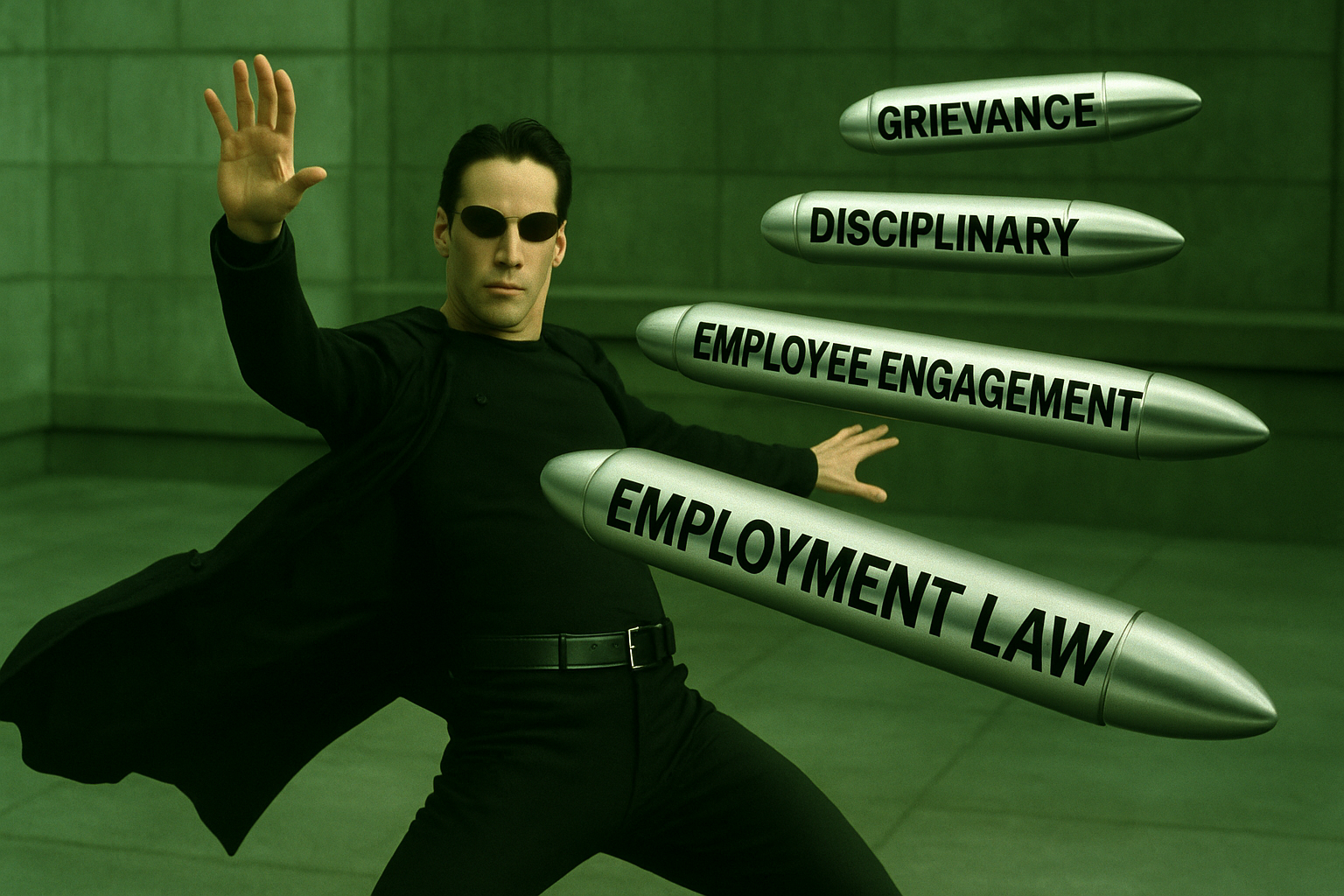Do You Really Need a Handbook? (Yes, and Here’s Why)
.jpeg)
If you’re running a start-up or small business, you might think employee handbooks are only for big organisations with their HR departments, legal teams, and laminated “values” posters hanging in reception. But here’s the truth: every business, no matter the size, benefits from having one.
It’s not about producing a dusty 50-page manual that nobody reads... It’s about creating a clear, go-to guide for how things work in your workplace. Think of it as the workplace Wikipedia for both you and your team. It keeps everyone on the same page, answers questions before they turn into problems, and shows your people you care about creating a great place to work.
But let’s break it down:
1. It Sets Clear Expectations
One of the biggest challenges for any business, especially as you grow, is making sure everyone understands how things are done in your workplace. Your handbook is your chance to spell out the essentials, such as:
- How you work day to day - What's the rhythm of your business? Are you a 9-5 operation, or do you have flexible working hours? How do you prefer people to communicate - quick Slack messages, emails, face to face chats?
- What you expect from your employees - This could be things like punctuality, professionalism, teamwork, respect for colleagues, and how they represent your business to customers or clients.
- What they can expect from you as an employer - Things like fair pay, safe working conditions, respect, training opportunities, flexibility, and support when they need it.
It's a bit like a mutual working agreement. Without a handbook, people tend to rely on guesswork, assumptions, or what they experienced in a previous job - which might be completely different from how you do things. And that's where the problems start.
Picture this - you think it's obvious that employees should ask before working from home. But a new hire assumes it's fine because that's how it worked at their last company. Or maybe you want your team to be logging all their holidays in their email calendar, but instead you get their requests through email, you forget about them and then find yourself panicking when they remind you or wondering where they are when they're not in the office. These small differences in expectations can easily turn into:
- Misunderstandings ("I didn't realise I wasn't supposed to do that…”)
- Frustration ("Why am I being told off for something no one explained?")
- Even conflict ("But you never told me that was the rule!")
A clear, well written handbook takes away the guesswork. Everyone knows the rules, the boundaries, and the opportunities from day one. That means fewer awkward conversations, fewer mistakes, and a smoother, happier working environment for everyone.
2. It Protects Your Business
Let’s be honest, no matter how positive your workplace culture is, things don’t always go to plan. People fall out. Misunderstandings happen. Mistakes are made. And every so often, you’ll face a tricky or sensitive situation that needs careful handling. This is where your handbook becomes more than just a “nice‑to‑have”. It’s part of your business protection toolkit. A well‑written handbook:
- Shows you’ve been clear about your policies and processes - You can point to a document that proves you’ve set expectations, shared the rules, and explained the consequences of breaking them.
- Helps you deal with situations consistently - Instead of making decisions on the fly (and risking accusations of unfairness), you have a framework to follow. The rules apply to everyone, and that keeps things fair and transparent.
- Can be a key piece of evidence if you ever face a legal claim - In an employment dispute, your handbook can help demonstrate that you acted reasonably, consistently, and in line with what you told employees from the start.
It’s not about running your business from a place of fear and it’s definitely not about creating an overly rigid rulebook. Instead, it’s about having strong, clear foundations so you can run your business confidently and fairly, even when things get complicated. Think of it like insurance. You hope you’ll never have to rely on it, but when the unexpected happens, you’ll be very glad it’s there.
3. It Helps New Starters Feel at Home
Starting a new job is exciting, but it can also be overwhelming. New hires are learning names, systems, and routines all at once, and it's easy for them to feel unsure about the "unwritten rules" of the workplace. In those first few weeks, they'll often have dozens of questions, such as:
- How do I book time off?
- Who approves expenses?
- What's the process if I need to work from home because the boiler's on the blink?
- How do I access shared files or systems?
Without a central place to find the answers, new starters can end up repeatedly interrupting their manager or colleagues - or worse, guessing and getting it wrong. A good handbook removes that uncertainty. It's a friendly, easy to read guide that covers both the practical details and the cultural "how we do things here" side of your business. By giving employees this resource from day one, you:
- Help them settle in faster
- Saves you time answering the same questions on repeat
- Reduce the stress of constantly asking for clarification
- Show them you've thought about their experience and want them to succeed
It's a small thing that makes a big difference in helping people feel like they belong - and when people feel they belong, they're more engaged, more productive, and more likely to stay.
4. It’s Not Just Rules. It’s Your Story
Yes, your handbook needs to include the essentials: policies on holidays, sickness absence, flexible working, conduct at work, and other key procedures etc. These are important for clarity and compliance. But if that’s all it is, your handbook risks feeling like a dry rulebook rather than something employees actually want to read. The best handbooks go beyond the “what” and dive into the why. They explain:
- Your vision - Where the business is going and why it exists.
- Your values -The principles that guide the way you work and make decisions.
- Your culture - The personality of your workplace and the behaviours you celebrate.
This transforms your handbook from a compliance document into a culture blueprint. It becomes a way of saying to new hires “Here’s who we are. Here’s what matters to us. And here’s how you can be part of it.” When people understand why you work the way you do, not just the rules you expect them to follow, they’re far more likely to feel connected to your business and motivated to contribute. Your handbook is a golden opportunity to show what makes your workplace special, unique, and worth being part of. Done well, it doesn’t just tell employees about your culture, it invites them into it.
5. It Builds Trust and Transparency
When your team can see your policies laid out clearly and openly it removes any doubts or suspicions about unfair treatment or “one rule for some, another for others.” Consistency is more than just a box to tick. It’s the foundation of trust. And trust is the secret sauce that keeps people:
- Engaged in their work
- Loyal to your business
- Motivated to give their best every day
The bottom line here is… A handbook isn’t about creating unnecessary bureaucracy or burying your people in red tape.
- It’s about clarity, making sure everyone knows what’s expected and what they can expect in return.
- It’s about consistency, ensuring rules are applied fairly and transparently for all.
- It’s about culture, helping people understand the environment they’re a part of and feel truly supported within it.
When done right, your handbook becomes more than just a document. It becomes a trusted guide that people actually want to read, refer to, and rely on, because it’s written with them in mind.
Pro Tip: Keep your handbook short, clear, and written in your business’s natural voice. This isn’t a law textbook, it’s a guide to working well together.
Make it something people feel comfortable dipping into whenever they need it.
BONUS - Your Handy Handbook Checklist:
- Clear day-to-day working practices - hours, communication, remote working
- Employee expectations - behaviour, attendance, dress code
- Employer commitments - pay, benefits, wellbeing support
- Essential policies - holidays, sickness, flexible working, grievance
- Company vision & values - the heart of your culture
- How you handle changes and updates - keeping everyone informed
- Practical FAQs - booking time off, expenses, IT support
Keep it simple, keep it human, and keep it relevant to your people and you’ll have a handbook your team actually uses. Need help creating or updating your handbook? Get in touch with Ig-hr, we’d love to support you in making it clear, practical, and tailored to your business.
Learn about the latest tools and tips in:
Related Articles
Let us help you build a high performing team.

.png)

















.jpg)

